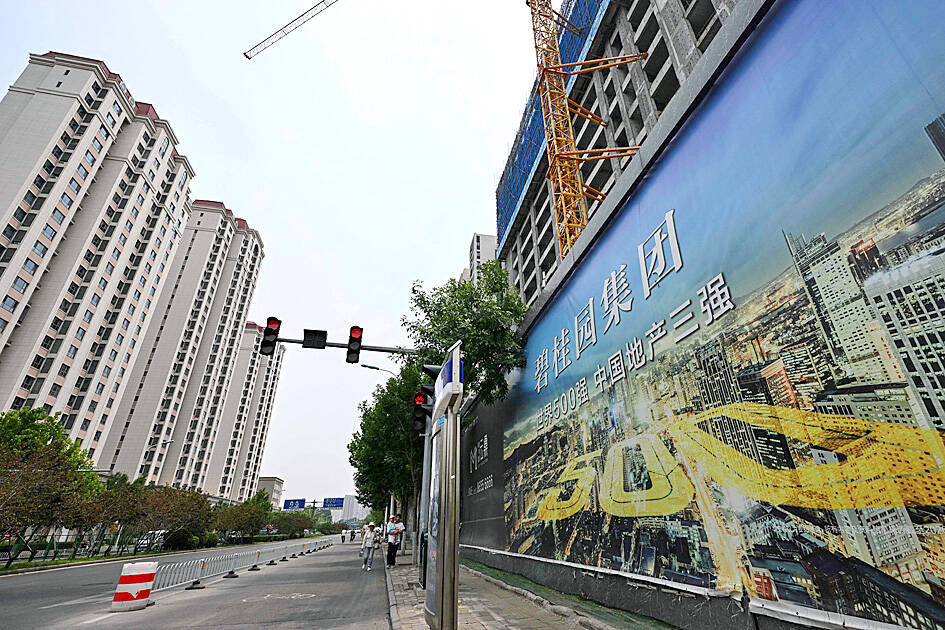Two global credit ratings firms lowered their forecasts for China’s property market, as an accelerating slump in home prices hampers the country’s efforts to rescue the sector.
S&P Global Ratings now expects residential sales to drop 15 percent this year, more than the 5 percent decline it projected earlier. That would put sales below 10 trillion yuan (US$1.4 trillion), about half the peak in 2021, the ratings company said on Thursday.
Fitch Ratings on Wednesday cut its annual sales estimate to a decrease of 15 to 20 percent, worse than an earlier estimate of a 5 to 10 percent drop.

Photo: AFP
The ratings firms’ bleaker outlook suggests they have little confidence that recent stimulus measures would end the property slump that has been dragging the world’s second-largest economy.
The institutions blame a bigger-than-expected drop in home prices, which deters buyers.
Values of new homes fell the most in almost a decade last month, while used-home prices had the sharpest decline in at least 13 years, official figures showed last week.
Real estate accounts for about 78 percent of household wealth in China — double the US rate — and families typically save for years, and borrow from friends and relatives to purchase a home.
Separately, a measure of foreign direct investment (FDI) in China declined for the 12th straight month, underscoring Beijing’s struggle to improve its appeal to overseas investors to boost growth.
Inbound FDI in China dropped 28.2 percent in the first five months of this year from the same period last year to 412.51 billion yuan (US$56.8 billion), data released by the Chinese Ministry of Commerce on Friday showed. The figure was worse than the 27.9 percent drop in April and extended a streak since June last year.
The ministry said FDI fell in January-to-May mainly because of a high comparison base and reiterated authorities have increased efforts to attract foreign investment since the beginning of the year.

MULTIFACETED: A task force has analyzed possible scenarios and created responses to assist domestic industries in dealing with US tariffs, the economics minister said The Executive Yuan is tomorrow to announce countermeasures to US President Donald Trump’s planned reciprocal tariffs, although the details of the plan would not be made public until Monday next week, Minister of Economic Affairs J.W. Kuo (郭智輝) said yesterday. The Cabinet established an economic and trade task force in November last year to deal with US trade and tariff related issues, Kuo told reporters outside the legislature in Taipei. The task force has been analyzing and evaluating all kinds of scenarios to identify suitable responses and determine how best to assist domestic industries in managing the effects of Trump’s tariffs, he

TIGHT-LIPPED: UMC said it had no merger plans at the moment, after Nikkei Asia reported that the firm and GlobalFoundries were considering restarting merger talks United Microelectronics Corp (UMC, 聯電), the world’s No. 4 contract chipmaker, yesterday launched a new US$5 billion 12-inch chip factory in Singapore as part of its latest effort to diversify its manufacturing footprint amid growing geopolitical risks. The new factory, adjacent to UMC’s existing Singapore fab in the Pasir Res Wafer Fab Park, is scheduled to enter volume production next year, utilizing mature 22-nanometer and 28-nanometer process technologies, UMC said in a statement. The company plans to invest US$5 billion during the first phase of the new fab, which would have an installed capacity of 30,000 12-inch wafers per month, it said. The

Taiwan’s official purchasing managers’ index (PMI) last month rose 0.2 percentage points to 54.2, in a second consecutive month of expansion, thanks to front-loading demand intended to avoid potential US tariff hikes, the Chung-Hua Institution for Economic Research (CIER, 中華經濟研究院) said yesterday. While short-term demand appeared robust, uncertainties rose due to US President Donald Trump’s unpredictable trade policy, CIER president Lien Hsien-ming (連賢明) told a news conference in Taipei. Taiwan’s economy this year would be characterized by high-level fluctuations and the volatility would be wilder than most expect, Lien said Demand for electronics, particularly semiconductors, continues to benefit from US technology giants’ effort

‘SWASTICAR’: Tesla CEO Elon Musk’s close association with Donald Trump has prompted opponents to brand him a ‘Nazi’ and resulted in a dramatic drop in sales Demonstrators descended on Tesla Inc dealerships across the US, and in Europe and Canada on Saturday to protest company chief Elon Musk, who has amassed extraordinary power as a top adviser to US President Donald Trump. Waving signs with messages such as “Musk is stealing our money” and “Reclaim our country,” the protests largely took place peacefully following fiery episodes of vandalism on Tesla vehicles, dealerships and other facilities in recent weeks that US officials have denounced as terrorism. Hundreds rallied on Saturday outside the Tesla dealership in Manhattan. Some blasted Musk, the world’s richest man, while others demanded the shuttering of his